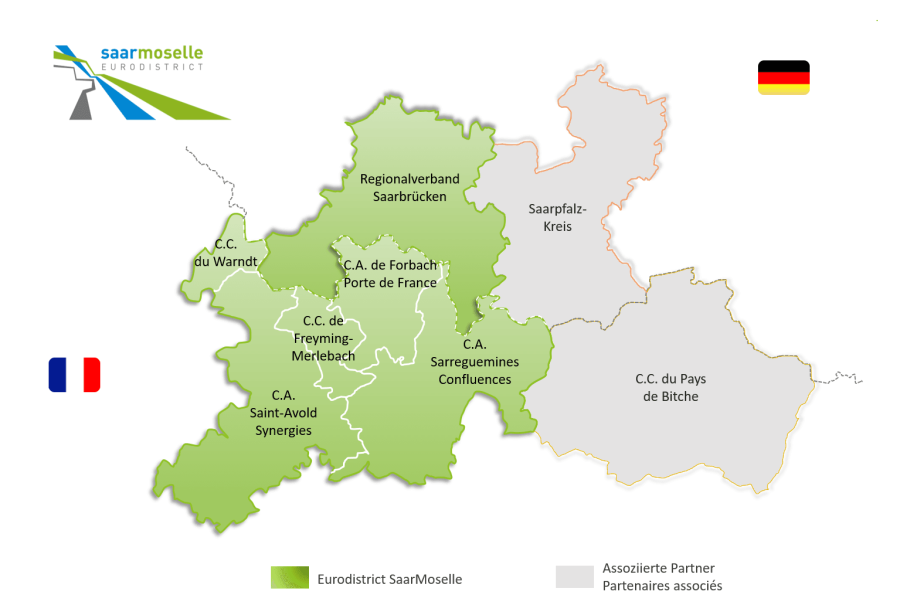The SaarMoselle Eurodistrict, home to 600,000 residents from France and Germany, is actively involved in developing a cross-border living space to effectively address the challenges associated with structural changes and the daily struggles faced by its inhabitants, particularly those arising from the existence of borders. This Good Practice article highlights the mutual efforts to provide better early childhood care in the cross-border area.
WHAT
Residents of border areas, such as the SaarMoselle Eurodistrict, are still faced today with a multitude of legal and administrative obstacles in accessing public services. Recognizing the opportunity to create bilingual and bicultural education structures, the two countries partnered up through the “Babylingua” project, with the aim to build and equip cross-border childcare facilities in the Eurodistrict. As such, after close cooperation between the municipalities of the Eurodistrict, the Kita Salut cross-border early childcare facility became a reality. The overall objective was on one hand to complete the bilingual offer present in the SaarMoselle living area intended for children aged 0 to 3 years, while increasing the reception capacity of the two communities, and on the other hand to improve access to childcare for cross-border workers and families interested in bilingual learning for their children. To ensure the blending of cultures, the Kita Salut nursery has reserved at least 22 places for children from Saarland and 11 places for children from the Sarreguemines city association. Facilities are modern and environmentally friendly and are located 20 minutes by car from Sarreguemines. Around 20 educational professionals will accompany the children promoting bilingualism by drawing on pedagogical knowledge and experience from France and Germany.
WHO
This project of the Eurodistric SaarMoselle is a result of a financial and operational partnership between the City of Sarrebruck and the Sarreguemines Confluences Urban Community (CASC). Beneficiaries of the Kita Salut nursery are children residing in one of the 38 municipalities of the Sarreguemines Confluences Urban Community with priority given to parents working in Germany or in the territory of the Sarreguemines Confluences Urban Community.

WHERE
The SaarMoselle Eurodistrict has nearly 600,000 inhabitants distributed among its member communities: the Saarbrücken Urban Community including the city of Saarbrücken (Regionalverband Saarbrücken, Landeshauptstadt Saarbrücken), the Urban Community of Forbach Porte de France, the Sarreguemines Confluences Urban Community, the Saint-Avold Synergie Urban Community, the Community of Communes of Freyming-Merlebach and the Community of Communes of Warndt. The Kita Salut childcare facility is located on the border region of Saarbrücken, Germany.
HOW
The entire Kita Salut structure represents an investment of around 10 million euros. The CASC will have contributed 600,000 euros of its own funds and the European Regional Development Fund (ERDF) will have paid nearly 2.3 million euros to the cross-border crèche project, through the 2014 - 2020 INTERREG V-A France - Belgium - Germany - Luxembourg (Grande Région / Großregion) Programme. The remaining amounts, almost 7 million euros, are jointly supported by the City of Saarbrücken, the Ministry of Education and Culture of the Land of Saarland as well as the Urban Community of Saarbrücken (Regionalverband Saarbrücken).
Operating costs are distributed in proportion to the places occupied between the aforementioned communities, as well as from the Moselle Family Allowance Fund for the places occupied by children coming from Moselle.
RESULTS
The Kita Salut nursery became a reality, opening its doors to children on September 6, 2023, with the capacity to accommodate 133 children aged 0 to 6. This educational model relies on educational framework concepts from both countries, thus contributing to cultural and linguistic integration. To enhance group cohesion and capacity building, the employees, who are hired under the same salary conditions, will take part in professional seminars on intercultural communication.
Read more on the Eurodistrict SaarMoselle's website!
- Inicie sessão para publicar comentários

